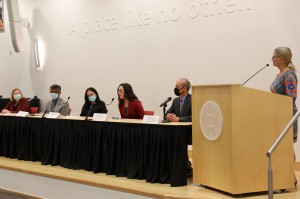
Hartford Public Library President and CEO Bridget E. Quinn, right, leads a panel discussion on closing the digital divide with, from left: Maureen Magnan, Deputy Commissioner, Department of Consumer Protection; Ajit Gopalakrishnan, Chief Performance Officer, State Department of Education; Nora Duncan, State Director, Connecticut AARP; Eileen Rhodes, Interim Director, Connecticut State Community College Library; and Doug Casey, Executive Director, Commission for Educational Technology.
To mark Digital Inclusion Week (Oct. 4-8), Hartford Public Library welcomed state officials to the Center for Contemporary Culture at the Downtown Library on Thursday, Oct. 7, for a discussion on efforts to close the digital divide in Connecticut.
Click here to watch a recording.
Panelists included Maureen Magnan, deputy commissioner of the state Department of Consumer Protection; Ajit Gopalakrishnan, chief performance officer at the state Department of Education; Nora Duncan, state director of Connecticut AARP; Eileen Rhodes, interim director of the Connecticut State Community College Library; and Doug Casey, executive director of the state Commission for Educational Technology.
“Digital literacy is more than just an educational concern,” said Hartford Public Library President and CEO Bridget E. Quinn. “The pervasiveness of the digital divide is a social justice issue, preventing the vulnerable in our communities from improving their lives and providing for their families. The fallout from this problem is wide-reaching. The areas with the least connectivity are also the most economically disadvantaged, something the COVID-19 pandemic has really brought to light.”
Listed below are some of the resources that were shared during the discussion:
Emergency Broadband Benefit
The Emergency Broadband Benefit will provide a discount of up to $50 per month towards broadband service for eligible households and up to $75 per month for households on qualifying Tribal lands. Eligible households can also receive a one-time discount of up to $100 to purchase a laptop, desktop computer, or tablet from participating providers if they contribute more than $10 and less than $50 toward the purchase price.
Who Is Eligible for the Emergency Broadband Benefit Program?
A household is eligible if a member of the household meets one of the criteria below:
- Has an income that is at or below 135% of the Federal Poverty Guidelines or participates in certain assistance programs, such as SNAP, Medicaid, or Lifeline;
- Approved to receive benefits under the free and reduced-price school lunch program or the school breakfast program, including through the USDA Community Eligibility Provision, in the 2019-2020, 2020-2021, or 2021-2022 school year;
- Received a Federal Pell Grant during the current award year;
- Experienced a substantial loss of income due to job loss or furlough since February 29, 2020 and the household had a total income in 2020 at or below $99,000 for single filers and $198,000 for joint filers; or
- Meets the eligibility criteria for a participating provider’s existing low-income or COVID-19 program.
Senior Planet
Senior Planet is about much more than just the latest gadgets and apps and websites. Those gadgets and apps and websites are just means to an end: enabling older adults and people of all ages to come together and find ways to learn, work, create, and thrive in today’s digital age.
Wherever you are in the world, you can subscribe to our newsletters and participate online. If you’re near one of our physical locations, even better! We’re active on the ground in six U.S. locations (with more coming soon).
Connecticut Department of Consumer Protection
Scammers often use “click bait”, or ads that appeal to you on social media, and send you threatening emails or texts with the hope that you reply with personal information, or click on a link that will allow them to access your personal information.
- OnGuard Online
- www.iKeepSafe.org
- www.netsmartz.org
- www.ncpc.org
- www.mcgruff.org
- www.staysafeonline.org
- www.staysafe.org
- www.wiredsafety.org